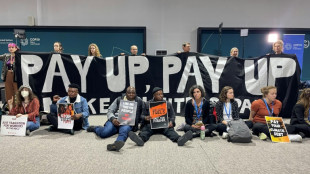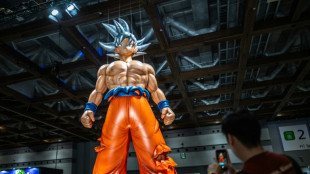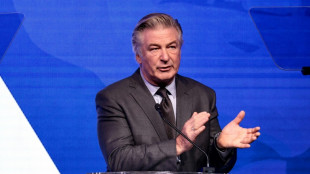
-
 Uganda opposition figure Besigye appears in military court
Uganda opposition figure Besigye appears in military court
-
General strike in Greece against cost of living

-
 UN nuclear chief welcomes Iran's 'concrete step' on uranium stockpile
UN nuclear chief welcomes Iran's 'concrete step' on uranium stockpile
-
Floods to shave 0.2 percentage points off Spain's growth

-
 Argentina's Contepomi makes one change for France Test
Argentina's Contepomi makes one change for France Test
-
'Steep climb' ahead as clock ticks on stalled climate talks

-
 Gatland changes four for Wales clash with South Africa
Gatland changes four for Wales clash with South Africa
-
'Sport will have the last word' as WRC title goes down to the wire in Japan

-
 Western powers move to censure Iran at UN nuclear meet
Western powers move to censure Iran at UN nuclear meet
-
US envoy presses Israel-Hezbollah truce bid in Lebanon visit

-
 'No controversy' around Alldritt exclusion for Argentina Test
'No controversy' around Alldritt exclusion for Argentina Test
-
Stock markets gain, dollar higher before Nvidia earnings

-
 New WHO financing mechanism put to the test
New WHO financing mechanism put to the test
-
Besigye kidnapping: Uganda president's doctor turned rival

-
 Star K-pop producer of NewJeans quits after legal spat with BTS agency
Star K-pop producer of NewJeans quits after legal spat with BTS agency
-
'Eternal' Nadal leaves legacy as he retires from tennis

-
 Vieira takes over at struggling Gerona
Vieira takes over at struggling Gerona
-
Australia's Kerevi banned for Morgan tackle

-
 Bellamy defies 'lunatic' reputation to inspire Wales revival
Bellamy defies 'lunatic' reputation to inspire Wales revival
-
Kremlin says US 'doing everything' to prolong 'war' in Ukraine

-
 Magritte painting nets auction record of $121 million
Magritte painting nets auction record of $121 million
-
Markets fluctuate as traders weigh geopolitical tensions

-
 N. Korea's latest weapon? Bombarding South with noise
N. Korea's latest weapon? Bombarding South with noise
-
'Kidnapped' Uganda opposition figure Besigye to appear at military court: lawyer

-
 Asian markets fluctuate as traders weigh geopolitical tensions
Asian markets fluctuate as traders weigh geopolitical tensions
-
'An inauspicious day': the landmines ruining Myanmar lives

-
 UN to vote again on Gaza ceasefire, US plans unclear
UN to vote again on Gaza ceasefire, US plans unclear
-
Japan's manga powerhouse 'Dragon Ball' turns 40

-
 Japanese, Koreans bottom of global love life survey
Japanese, Koreans bottom of global love life survey
-
Son blames 'mistakes' after South Korea held by Palestine in qualifier

-
 Japan ramps up tech ambitions with $65 bn for AI, chips
Japan ramps up tech ambitions with $65 bn for AI, chips
-
Lights, action, melodrama! Silent films get new reel at London haven

-
 Myanmar led world in landmine victims in 2023: monitor
Myanmar led world in landmine victims in 2023: monitor
-
ICC to sentence Timbuktu war criminal

-
 Ugandan opposition figure Besigye 'kidnapped', says wife
Ugandan opposition figure Besigye 'kidnapped', says wife
-
Australia's Jason Day eyes more major glory after resurgence

-
 Machu Picchu security boosted after visitors spread human ashes
Machu Picchu security boosted after visitors spread human ashes
-
Popovic hails Australia character in 'crazy' World Cup qualifier

-
 Taliban govt clearing 'un-Islamic' books from Afghanistan shelves
Taliban govt clearing 'un-Islamic' books from Afghanistan shelves
-
Argentina beat Peru as Uruguay hold Brazil

-
 Asian markets struggle as traders weigh geopolitical tensions
Asian markets struggle as traders weigh geopolitical tensions
-
Tatum stars as Celtics end Cavaliers unbeaten start

-
 Hurting India under pressure in blockbuster five-Test Australia series
Hurting India under pressure in blockbuster five-Test Australia series
-
'They killed her dream': Israel strike leaves woman footballer in coma

-
 Iraq holds its first census in nearly 40 years
Iraq holds its first census in nearly 40 years
-
Iraqis face tough homecoming a decade after IS rampage

-
 Russian net tightens around last civilians left in eastern Ukraine
Russian net tightens around last civilians left in eastern Ukraine
-
Olympic champion Tebogo aims to inspire next generation of African athletes

-
 Valencia on target as ten-man Ecuador upset Colombia
Valencia on target as ten-man Ecuador upset Colombia
-
'Rust' to premiere three years after on-set shooting


New WHO financing mechanism put to the test
The WHO announced late Tuesday that it had raised nearly $4 billion through a new financing mechanism, aimed at securing predictable funding, as shifting political winds threaten cuts from Washington.
The announcement, made on the sidelines of the G20 summit in Rio de Janeiro, came as the stakes have risen substantially for the World Health Organization since Donald Trump won the US presidential election earlier this month.
During his first term in office, from 2017 to 2021, the Republican relentlessly attacked the UN health agency, over its handling of the Covid pandemic especially. It began withdrawing his country -- traditionally the WHO's top donor -- from the organisation.
Although President Joe Biden renewed ties with the agency, there are fears that Trump might slam the door shut again.
The Geneva-based organisation said that pledges from Australia, Indonesia and Spain at the G20 summit, combined with earlier donations and pledges, had yielded $3.8 billion in funding for the next four years -- more than half of the funding gap it needs to fill through 2028.
Here is an overview of how WHO funding works and what the new mechanism set up in May aims to achieve:
- Imbalances -
When the WHO was created in 1948, it received all of its funding through so-called assessed contributions, or the membership fees that each member state pays, based on the size of their economies.
"That money was predictable, because you know what you're going to get each year," Daniel Thornton, head of the WHO's Coordinated Resource Mobilisation unit, told AFP. Those funds could also be used flexibly, in line with the organisation's strategy, he added.
However, over the years, the WHO became increasingly reliant on voluntary contributions.
In 2022-2023, membership fees covered just 13 percent of the agency's budget, the remainder covered by voluntary contributions.
Such funds are far less predictable and are typically earmarked for specific projects, giving the Geneva-based organisation little flexibility over how they are used.
This funding imbalance has meant that "generally, communicable diseases are better funded than non-communicable, (even though) the disease burden is much heavier on non-communicable diseases", Thornton said.
- Investment round -
At the height of the Covid-19 pandemic in 2020, the UN health agency created the WHO Foundation to marshal new resources from business and philanthropists.
Two years later, member states agreed to immediately increase the portion of the WHO's biannual budget covered by membership fees to 20 percent, and to gradually raise it further to 50 percent by 2030-31.
The organisation also launched last May a new investment round aimed at securing as much funding as possible up front for its core activities over the next four years (2025-28).
The WHO is not asking for more funds, but "is moving from a process where we get a continuous stream of income to one where we ... want the four years' funding up front", Thornton said.
- $7.1 billion -
The WHO estimates it will need $11.1 billion over the coming four years.
The agency expects to secure more than a third of that, some $4 billion, thanks in part to expected membership fee hikes.
That has left it seeking to raise $7.1 billion to close the gap, as it solicits both public and private donors including foundations.
With the latest pledges, it has now covered 53 percent of that amount.
Since the start of the investment round in May, the agency has attracted dozens of new donors, including over a dozen in African nations.
Regardless of political shifts in Washington, Thornton stressed that the WHO was intent on seeing the "very important" partnership with the United States continue.
"That is our priority," he said, stressing that another major concern was to ensure "we've got a broad donor base".
M.A.Colin--AMWN